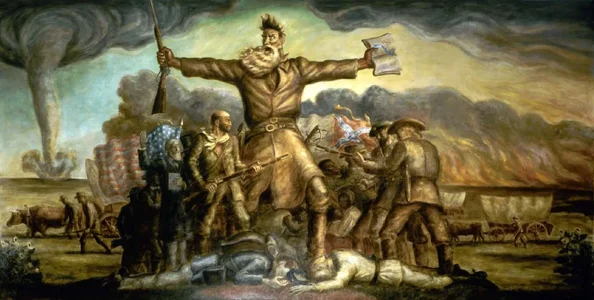MendotoManteo
Esteemed Member
- Messages
- 593
Of all the figures in American history that intrigue me the most, it's John Brown. Whatever one may think of him, I believe him to be the most exceptional American that has ever lived. He's largely fallen into the dustbin of history, although the Showtime "The Good Lord Bird" miniseries during Covid seems to have revived his legacy a bit. (It's very good, by the way, and I recommend a watch. Ethan Hawke great.)
In his biography of the man, Evan Carton writes the following in his preface:
"For drama, controversy, and historical impact, the life of John Brown exceeds that of any other private citizen of the United States. If American patriotism is defined as unqualified commitment to the nation's founding religious and political ideals - a commitment both to live by them and to die for them - then Brown may count as one of America's first patriots, though he was not born until 1800 and was hanged for treason in 1859."
I remember, growing up, to the extent we were taught anything at all about Brown, it was as if a footnote. Or even some insane caricature.
Perhaps it's my socialist sympathies, but I think the way we look at the Revolution and the Civil War is wrong. The Revolution was not a revolution. In fact, it was a class war between the colonial and British elites. The Civil War was a revolution, provided you consider it began at Harper's Ferry in 1859 and not at Fort Sumter in 1861.
Whatever the case, what do you consider the historical impact of John Brown? And what do you consider him to be: patriot, traitor, terrorist, etc?
In his biography of the man, Evan Carton writes the following in his preface:
"For drama, controversy, and historical impact, the life of John Brown exceeds that of any other private citizen of the United States. If American patriotism is defined as unqualified commitment to the nation's founding religious and political ideals - a commitment both to live by them and to die for them - then Brown may count as one of America's first patriots, though he was not born until 1800 and was hanged for treason in 1859."
I remember, growing up, to the extent we were taught anything at all about Brown, it was as if a footnote. Or even some insane caricature.
Perhaps it's my socialist sympathies, but I think the way we look at the Revolution and the Civil War is wrong. The Revolution was not a revolution. In fact, it was a class war between the colonial and British elites. The Civil War was a revolution, provided you consider it began at Harper's Ferry in 1859 and not at Fort Sumter in 1861.
Whatever the case, what do you consider the historical impact of John Brown? And what do you consider him to be: patriot, traitor, terrorist, etc?



